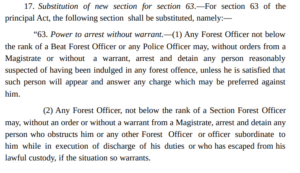Published Dec 26, 2024 | 9:00 AM ⚊ Updated Dec 26, 2024 | 9:00 AM

A forest in Kerala. (Creative Commons)
As the December 31 deadline for submitting suggestions on the Kerala Forest (Amendment) Bill, 2024 approaches, protests are intensifying across the state, with key allies of the Left Democratic Front (LDF) joining the opposition.
The proposed Bill, which grants expanded powers to forest officials, has ignited sharp criticism for provisions deemed anti-farmer and anti-people.
Farmers, political parties, and religious organisations are rallying against the Bill, citing concerns over its potential misuse and detrimental impact on livelihoods.
At the heart of the protests are two contentious provisions of the Bill.
Section 63 grants forest officials the authority to arrest and detain individuals suspected of forest offences without a warrant. Critics argue this provision fosters bureaucratic overreach and violates the principles of natural justice.

One of the contentious provisions of the Bill
Additionally, the Bill proposes expanding the application of forest regulations to areas outside reserved forests, including inhabited farmlands.
Activists warn this could lead to the criminalisation of routine activities such as fishing, collecting firewood, or bathing in rivers. Other provisions include higher fines for forest-related offences and the power for forest officials to search vehicles and premises without prior approval.
The Kerala Congress (M) [KC(M)], a prominent constituent of the LDF and a significant voice in Central Travancore, has taken up the issue with Chief Minister Pinarayi Vijayan.
On 23 December, KC(M) chairman Jose K Mani met with the chief minister to discuss the contentious provisions.
Following the meeting, Mani stated that the chief minister had assured a thorough review of the Bill and pledged to address any provisions that could harm farmers.
“We highlighted the intricacies and implications of the Bill, particularly Section 63, which grants forest officers unchecked powers to arrest without a magistrate’s order or warrant,” said Mani to the media.
He then stated, “This Bill is completely anti-farmer and fosters bureaucratic overreach.”

KC (M) leaders handing over their representation to the CM against the Bill
Mani pointed out that under the proposed amendment, lower-ranked forest officials, such as beat forest officers, would have the authority to make arrests—powers traditionally reserved for police officers of sub-inspector rank or higher.
“This could lead to misuse of power, and we conveyed to the chief minister that such provisions are unacceptable,” he added.
Another area of concern is the Bill’s potential impact on non-reserved forest areas like Mankulam, which are inhabited by thousands of farmers.
The KC(M) Parliamentary Party submitted a detailed memorandum to the chief minister, urging a rollback of the anti-farmer provisions and expressing hope for amendments that would safeguard the interests of the farming community.
While Forest Minister AK Saseendran defended the Bill, claiming it is not anti-farmer, differences of opinion have surfaced within the LDF.
He pointed out that KC(M)’s Minister Roshy Augustine had not voiced dissent during cabinet discussions. Saseendran further accused critics of misinterpreting the Bill.
But Jose K Mani countered, suggesting that officials may have misled the Minister about its implications.
Beyond the LDF, the opposition is mounting significant pressure on the government.
Kerala Congress chairman PJ Joseph described the Bill as “dangerous and anti-people,” alleging it seeks to expand forest boundaries and create buffer zones at the cost of farmers’ lands.
“This amendment will empower forest officials to detain anyone without judicial oversight, criminalise everyday activities like collecting firewood or grazing cattle, and leave farmers vulnerable to forced eviction,” Joseph warned.
He also highlighted the issue of wild animal incursions into farmlands, criticising the government for failing to protect farmers from such threats.
The Kerala Independent Farmers Association (KIFA) echoed these concerns, dubbing the Bill a move toward a “Forest Raj” in Kerala.
Meanwhile, the Kerala Catholic Bishops’ Council (KCBC) has also come out strongly against the Bill, arguing that it harms the interests of farmers and rural communities.
Interestingly, not all religious organisations are opposing the Bill.
The Church of South India (CSI) has welcomed the proposed legislation, endorsing it as a step toward sustainable forest management.
In a public representation signed by six bishops, the CSI emphasised the importance of preserving Kerala’s forests for biodiversity and ecological balance.
“The Kerala Forest (Amendment) Bill, 2024, is a beacon of hope to reverse ecological destruction,” the representation stated.
The CSI bishops urged the government to pass the Bill without diluting its provisions, describing it as a model for global ecological responsibility.
The draft Bill has sparked protests across the state, particularly in Idukki, where farmers and the Catholic Church are leading the resistance.
The Syro-Malabar Church has suggested amendments to address wild animal incursions and ensure accountability for forest officials.
The Idukki Land Freedom Movement, termed the Bill draconian, alleging it would pave the way for the eviction of farmers.
Meanwhile, KPCC President K Sudhakaran has called for the immediate withdrawal of the Bill, labelling it a conspiracy against farmers and tribal communities.
According to the Forest Department, it proposed significant amendments to the Forest Act to protect biodiversity from threats like waste dumping and illegal activities.
As forest areas are often used as dumping grounds for plastic and other waste, this leads to polluting of ecosystems and endangering rare species.
Some key measures include:
Declaring littering, dumping plastic, and poisoning water bodies in or near forests as punishable offences.
Expanding penalties under Section 27 to include:
Damaging boundary markers.
Sand quarrying within forests.
Entering Reserved Forests with weapons or explosives.
Feeding, teasing, or harming wildlife.
Poisoning or fishing in forest water bodies.
To combat organised resistance in remote areas, forest officers has also been empowered to arrest offenders on the spot.
Penalties for offences will also be increased to act as stronger deterrents, with clarified provisions for compounding certain violations.
As the debate rages, the Forest and Wildlife Department has invited public suggestions on the Bill until 31 December.

Notice inviting suggestions
Farmers, activists, and legal professionals are expected to make their voices heard in the coming days.
With strong opposition from multiple stakeholders and even dissent within the ruling coalition, it seems, the future of the Kerala Forest (Amendment) Bill, 2024, hangs in the balance.
Whether the government will address the mounting concerns or push ahead with the controversial provisions remains to be seen.
The Bill is expected to be tabled in the upcoming Assembly session.
(Edited by Ananya Rao)

